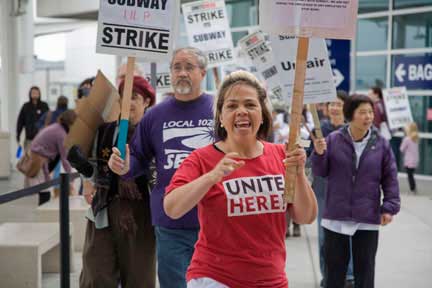
Hayat Selmani showed up at the Oakland Airport at 7 AM Sunday. But she didn’t have on her uniform from the Subway sandwich concession. She wore street clothes. And instead of going to work, she picked up a sign and went on strike.
During the next half hour, several dozen other food concession workers joined her. A few wore their work uniforms, but most put on T-shirts with the logo of their union, Unite Here. Selmani, a slim young woman and a little shy, explained in a soft voice with a slight South Asian accent that although supporting the union was scary at first, it wasn’t any longer.
“I’m on strike to stand up for my rights and to show my boss that I’m not scared, ” she said. “I’m standing up to bring my coworkers back and to make them give me my hours back.”
A year ago, organizers from Local 2850 of Unite Here began talking with Selmani and other workers at the Subway and Jamba Juice concessions. The union already had a contract with the parent concessionaire at the airport, HMS Host, that covered a number of concessions. But some franchises, particularly those two, were very opposed.
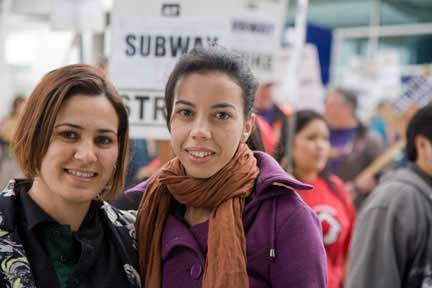 H.A. and Hayat Selmani. (Photo: David Bacon)Selmani’s coworker, H.A., a Berber immigrant from Algeria, was interested in what the union had to say. “They were making us work like slaves,” she said. “I used to work 12 hours a day with just one ten-minute break and 20 minutes for lunch.”
H.A. and Hayat Selmani. (Photo: David Bacon)Selmani’s coworker, H.A., a Berber immigrant from Algeria, was interested in what the union had to say. “They were making us work like slaves,” she said. “I used to work 12 hours a day with just one ten-minute break and 20 minutes for lunch.”
Jobs at the airport are covered by Oakland’s living wage ordinance, which mandates a minimum salary of $11.70 per hour with health care and $13.45 per hour without it, but only for businesses with more than 20 employees. In 2006, however, the port commission passed a measure requiring that all concessions on port property to implement the ordinance.
But to keep an airport job at that wage, Subway workers said they also had to work at the other locations for the state minimum wage of $7.50 (now $8). “They’d make us open at one store and close at another,” H.A. said. “Some worked at a Subway at a gas station all night. Sometimes they’d have someone work 26 hours straight without any overtime pay or any breaks. It was just awful.”
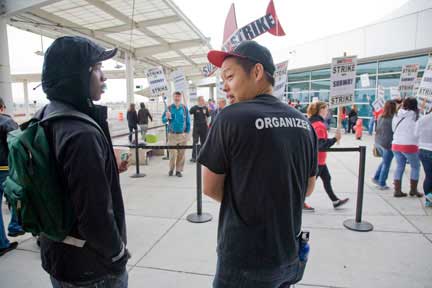 Organizer and worker. (Photo: David Bacon)The living wage ordinance also mandates other benefits. “At the airport, you’re supposed to have 12 sick days a year,” Selmani said. “But we never knew that until the union came.”
Organizer and worker. (Photo: David Bacon)The living wage ordinance also mandates other benefits. “At the airport, you’re supposed to have 12 sick days a year,” Selmani said. “But we never knew that until the union came.”
H.A. said, “I was sick for ten days, but they didn’t pay me for them. They didn’t pay sick days for anyone else either.”
Subway says it is not bound by these provisions. After a port commission investigation, Michael Foster, a lawyer for Navdeep and Gurinder Grewal, who own the Subway concession, told a reporter for the East Bay Express that “the port does not have the authority to amend a City Charter provision approved by the voters.” Calls to the Grewals asking for comment were not returned.
Once the workers understood what the living-wage ordinance said, they began to complain publicly that concessionaires at the airport weren’t complying, not just at Subway but at Jamba Juice, Auntie Ann’s and See’s Candies, as well. H.A. and Selmani complained.
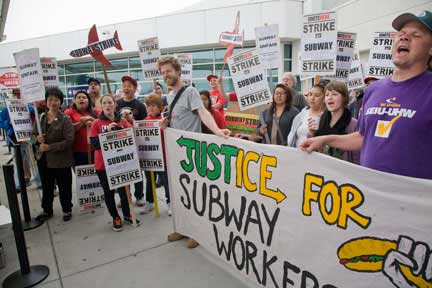 Justice for Subway Workers. (Photo: David Bacon)“A year ago, I started to organize my coworkers, and we decided to form a union,” H.A. said. “We went public and gave a petition to the employer. Then they fired me because they found out that I was the leader.”
Justice for Subway Workers. (Photo: David Bacon)“A year ago, I started to organize my coworkers, and we decided to form a union,” H.A. said. “We went public and gave a petition to the employer. Then they fired me because they found out that I was the leader.”
Selmani said her hours were cut. “I used to work more than 30 hours a week, and now I have less than 20 hours,” she said. “I can’t pay my bills now. I can’t even afford my rent. I asked them to give me my hours back. And when they wouldn’t, I had to look for another job. That’s how I can pay my rent now, by working two jobs.”
H.A. couldn’t pay her bills either. “It’s been very hard for me. I’m a student, and I couldn’t focus at school. I had to drop out to look for a job, any job. My husband began to work 24 hours straight, as a driver for Super Shuttle. But he told me, ‘H.A., go to school. I’ll support you.’ ”
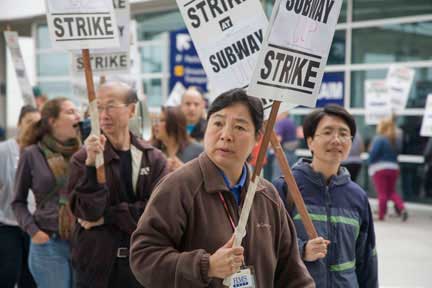 Other airport workers picket in support. (Photo: David Bacon)When H.A. tried to find jobs at the airport, she was rebuffed repeatedly. “I believe that because my story became so public I couldn’t get any job there,” she said. “I think maybe I was blacklisted, that other employers thought I was a troublemaker. HMS Host has been hiring other workers. I know how to work at the airport, and I’m eligible for the badge. So I don’t know why they would say no every time. And I applied for every single position. But they would not let me go in.”
Other airport workers picket in support. (Photo: David Bacon)When H.A. tried to find jobs at the airport, she was rebuffed repeatedly. “I believe that because my story became so public I couldn’t get any job there,” she said. “I think maybe I was blacklisted, that other employers thought I was a troublemaker. HMS Host has been hiring other workers. I know how to work at the airport, and I’m eligible for the badge. So I don’t know why they would say no every time. And I applied for every single position. But they would not let me go in.”
The union filed charges with the National Labor Relations Board, alleging that H.A. and two other workers had been fired because of their union support. After an investigation, the board’s regional office charged the Grewals with violating the law.
Meanwhile the Port of Oakland conducted its own investigation. In January, it found that the Grewals and Joey Cook, who owns CMC Services and the Jamba Juice concession, violated the living-wage ordinance requirements on sick pay for four workers – H.A., Selmani, Liam Adhikari (all from Subway) and Diamond Ford (at Jamba Juice). On April 10, it concluded that H.A. had been illegally fired to punish her for complaining and supporting the union. The port ordered her reinstatement with back pay. The Grewals are now appealing the port’s decision to Superior Court.
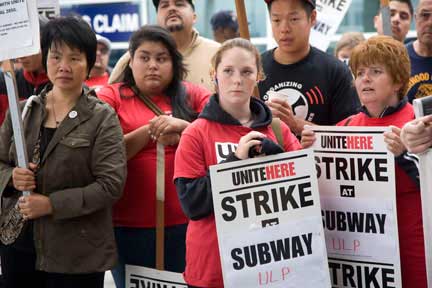 Union rally at the airport. (Photo: David Bacon)On April 18 H.A. showed up at Subway, ready to go back to work. “On that day I put on my uniform and went to ask for my job. I should have been on the schedule. The employer wasn’t there. So I asked the workers there to call her, but she wouldn’t show up or even talk to me on the phone. I felt very disrespected. I want to go back with my head high. I didn’t do anything wrong. I simply reported the violations, and they were breaking lots of laws. I needed to stand up and do something about it.”
Union rally at the airport. (Photo: David Bacon)On April 18 H.A. showed up at Subway, ready to go back to work. “On that day I put on my uniform and went to ask for my job. I should have been on the schedule. The employer wasn’t there. So I asked the workers there to call her, but she wouldn’t show up or even talk to me on the phone. I felt very disrespected. I want to go back with my head high. I didn’t do anything wrong. I simply reported the violations, and they were breaking lots of laws. I needed to stand up and do something about it.”
When asked why the company hadn’t been forced to take her back, she responds, “I don’t have an answer for that. It’s so weird that the port can’t force them to follow their own decisions. It seems like these employers have more power than the port commissioners. We want a fair process to form the union. We have the right to form the union. I don’t know why I don’t have that right at the Oakland Airport, which is public property.”
The port did finally agree to go to court to get an injunction ordering Subway to rehire H.A.. She’s still out of work, however, and the workers and the union have grown tired of waiting. They organized a one-day strike to put pressure on the concessions. Because the workers are striking over violations of federal law, in what’s called an unfair-labor-practices strike, it would be illegal for the concessions to hire other workers to permanently replace them. They carried picket signs conspicuously warning their action was a “ULP strike.”
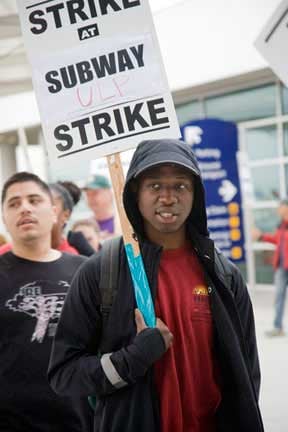 Unfair-labor-practice strike. (Photo: David Bacon)Meanwhile, during the past year Selmani lost her fear. “It’s been a long time,” she said. “I’ve worked at Subway for two years. I was working there when H.A. lost her job because she was for the union. They fired other workers, too. I was upset and scared, and I thought maybe they’d fire me too. But now I’m not scared anymore.”
Unfair-labor-practice strike. (Photo: David Bacon)Meanwhile, during the past year Selmani lost her fear. “It’s been a long time,” she said. “I’ve worked at Subway for two years. I was working there when H.A. lost her job because she was for the union. They fired other workers, too. I was upset and scared, and I thought maybe they’d fire me too. But now I’m not scared anymore.”
She even told the Grewals that she’d be striking Sunday morning. “They didn’t want me to go on strike. They said I should come to work because they needed me. But I want my hours back and my coworkers back. We know we need justice. It’s time now for the people who don’t respect the law to go straight. Plus, this job is too hard and stressful, and I want to feel comfortable at work. Every time it gets busy and we’re only two or three people, there are long lines. I want them to bring more people to work.
For H.A. the goal is even simpler. “We’re going to have good jobs in Oakland. That’s my big picture – to have good jobs in Oakland.”
Copyright © David Bacon
24 Hours Left: All gifts to Truthout now matched!
From now until the end of the year, all donations to Truthout will be matched dollar for dollar up to $18,000! Thanks to a generous supporter, your one-time gift today will be matched immediately. As well, your monthly donation will be matched for the whole first year, doubling your impact.
We have just 24 hours left to raise $18,000 and receive the full match.
This matching gift comes at a critical time. As Trump attempts to silence dissenting voices and oppositional nonprofits, reader support is our best defense against the right-wing agenda.
Help Truthout confront Trump’s fascism in 2026, and have your donation matched now!